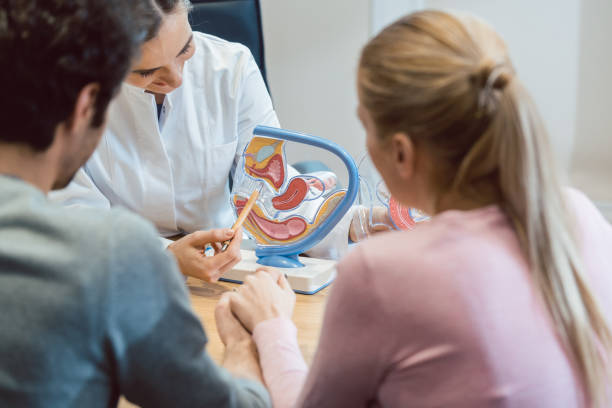Make an Appointment
Infertility is defined as not being able to get pregnant despite having frequent, unprotected sex for at least a year for most couples. What is infertility? It may result from an issue with either you or your partner or a combination of factors that prevent pregnancy. With time, many safe and effective therapies significantly improve your chances of getting pregnant.
What are the symptoms of infertility? What is infertility? The main symptom of infertility is not getting pregnant. There may be no other obvious symptoms. At times, women with infertility may have irregular or absent menstrual periods. In the case of men with infertility may have some signs of hormonal problems, such as changes in hair growth or sexual function. Most couples eventually conceive, with or without treatment.
What is infertility? What is it when it comes to men? They need to see a doctor if they have a low sperm count or other problems with sperm. A history of testicular, prostate or sexual problems or undergone treatment for cancer or small testicles or swelling in the scrotum or others in your family with infertility problems. All steps during ovulation and fertilization need to happen correctly to get pregnant. Sometimes the issues that cause infertility in couples are present at birth, and sometimes they develop later in life. Infertility causes can affect one or both partners.
Causes of male infertility may include abnormal sperm production or function due to undescended testicles, genetic defects, health problems such as diabetes, or infections such as chlamydia, gonorrhoea, mumps or HIV. Enlarged veins in the testes also can affect the quality of sperm.
Problems with the delivery of sperm due to sexual problems, such as premature ejaculation; certain genetic diseases, such as cystic fibrosis; structural problems, such as a blockage in the testicle; or damage or injury to the reproductive organs.
Overexposure to certain environmental factors, such as pesticides and other chemicals, and radiation. Cigarette smoking, alcohol, marijuana, anabolic steroids, and taking medications to treat bacterial infections, high blood pressure, and depression also can affect fertility. Frequent exposure to heat, such as in saunas or hot tubs, can raise body temperature and may affect sperm production. Damage related to cancer and its treatment, including radiation or chemotherapy. Cancer treatment can impair sperm production, sometimes severely.
Causes of female infertility include ovulation disorders, which affect the release of eggs from the ovaries. These include hormonal disorders such as polycystic ovary syndrome. Hyperprolactinemia, a condition in which you have too much prolactin the hormone that stimulates breast milk production also may interfere with ovulation. Either too much thyroid hormone (hyperthyroidism) or too little called (hypothyroidism) can affect the menstrual cycle or cause infertility. Other underlying causes may include too much exercise, eating disorders or tumours.
Uterine or cervical abnormalities, including abnormalities with the cervix, polyps in the uterus or the shape of the uterus. Non-cancerous tumours in the uterine wall may cause infertility by blocking the fallopian tubes or stopping a fertilized egg from implanting in the uterus. Fallopian tube damage or blockage is often caused by inflammation of the fallopian tube. This can result from pelvic inflammatory disease, which is usually caused by a sexually transmitted infection, endometriosis or adhesions.
Endometriosis, which occurs when endometrial tissue grows outside of the uterus, may affect the function of the ovaries, uterus and fallopian tubes. Primary ovarian insufficiency or early menopause is when the ovaries stop working and menstruation ends before age forty. Although the cause is often unknown, certain factors are associated with early menopause, including immune system diseases, certain genetic conditions such as Turner syndrome or carriers of Fragile X syndrome, and radiation or chemotherapy treatment.
Pelvic adhesions are bands of scar tissue that bind organs that can form after pelvic infection, appendicitis, endometriosis or abdominal or pelvic surgery. Cancer and its treatment. Certain cancers particularly reproductive cancers often impair female
fertility
. Both radiation and chemotherapy may affect fertility. It is suggested to visit a doctor if you cannot conceive. With the improvement in technologies, many cases of infertile people being fertile have been recorded.


3 Comments
Pingback: What is infertility? – Sujata Birla Hospital
Pingback: Celiac Disease | Symptoms & Causes | Sujata Birla Hospital
Pingback: How Hormones Affect Your Health | Sujata Birla Hospital